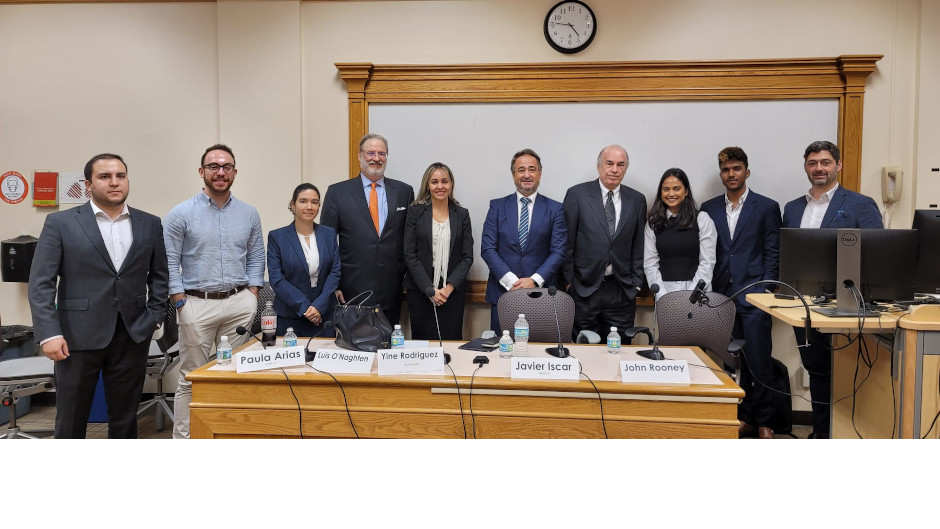Miami Law's International Arbitration Society, in collaboration with the International Moot Court Program, recently hosted the first in-person event this semester after the pandemic. The live event discussed the use of discovery in international commercial arbitration, focusing on 28 U.S.C. § 1782, a statute that allows discovery in the United States for use in a foreign proceeding, and its application in international commercial arbitration.
The students were fortunate to engage with a reputable set of highly experienced speakers who participated in the event, which Professor Paula Arias, director of the International Moot Court Program, moderated. The panel was comprised of Professor Luis O'Naghten, a partner at Hughes Hubbard; Yine Rodriguez, a partner at FisherBroyles; Professor John H. Rooney, Jr., an independent practitioner and coach for the program; and Javier Iscar, secretary-general of the European Association of Arbitration, who traveled from Spain to participate in the event.
The event's topic stemmed from the hotly contested issue that was meant to be resolved in the U.S. Supreme Court case, Servotronics Inc. v. Rolls-Royce PLC, of whether Section 1782 could be used to obtain discovery in connection with international commercial arbitrations. Even though the case got dismissed before the court could decide on the issue, the matter remains controversial. The question remains: was that the end, or would there be a future for uniformity around the application of §1782?
It appears that a possible opportunity is on the horizon. On September 10, 2021, ZF Automotive U.S., Inc., et al v. Luxshare, Ltd., requested a petition for a writ of certiorari before judgment to the United States Court of Appeals for the Sixth Circuit and sought reversal of the order of the United States District Court for the Eastern District of Michigan requiring petitioners to produce discovery under 28 U.S.C. § 1782(a). This case presents the same underlying legal question as in Servotronics, Inc. v. Rolls-Royce of whether a private commercial arbitral panel qualifies as a “foreign or international tribunal” under Section 1782, which authorizes district courts to compel testimony or evidence to be used in a international arbitration proceeding.
So, with their wealth of experience in diverse jurisdictions, the panelists discussed the weight "U.S. discovery" holds in international jurisdictions. They provided their insights on the possible measures that may take place to regulate the application of Section 1782, along with their opinions as to what extent Section 1782 might apply in the future.
They shared their practical experiences dealing with U.S.-style discovery in international arbitration proceedings, which allowed the students to gain a diverse outlook. The panelists concluded that even though the ultimate question of whether U.S. discovery can be ordered for international arbitrations remains unanswered, the application of Section 1782 will undoubtedly be beneficial for the industry.
The dynamic discussion ended on a hopeful note, with the panelists relying on the Supreme Court’s upcoming decision in ZF Automotive U.S., Inc., et al v. Luxshare, Ltd, U.S. to finally end this lack of consistency between the circuits and resolve this issue, which would grant uniformity and provide certainty for future arbitrations.

